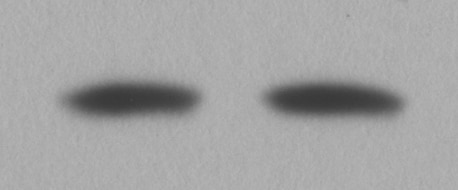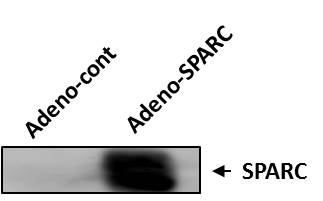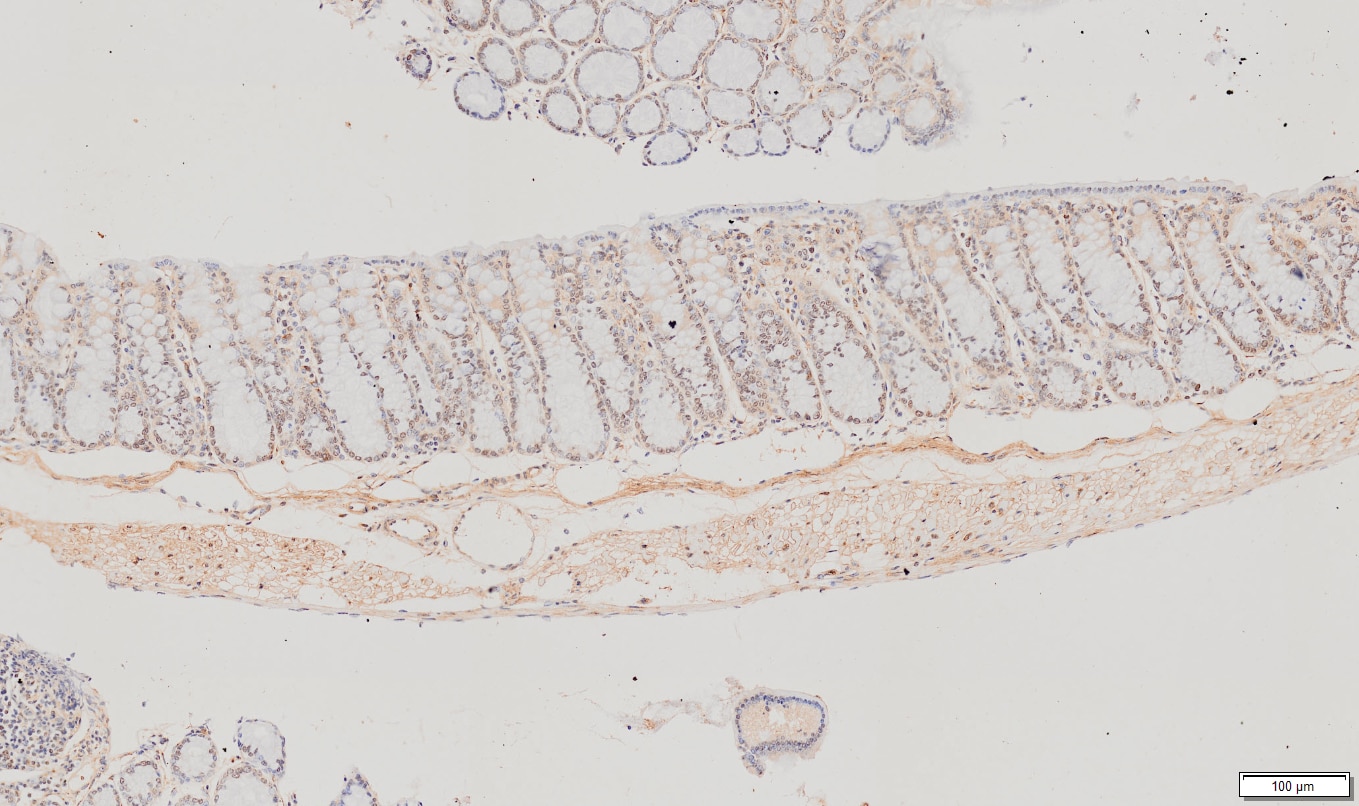Mouse SPARC Antibody Summary
Ala18-Ile302
Accession # P07214
Applications
Please Note: Optimal dilutions should be determined by each laboratory for each application. General Protocols are available in the Technical Information section on our website.
Scientific Data
 View Larger
View Larger
Detection of Mouse SPARC by Western Blot. Western blot shows lysates of C2C12 mouse myoblast cell line and mouse placenta tissue. PVDF membrane was probed with 0.2 µg/mL of Goat Anti-Mouse SPARC Antigen Affinity-purified Polyclonal Antibody (Catalog # AF942) followed by HRP-conjugated Anti-Goat IgG Secondary Antibody (Catalog # HAF017). A specific band was detected for SPARC at approximately 35-37 kDa (as indicated). This experiment was conducted under reducing conditions and using Immunoblot Buffer Group 1.
 View Larger
View Larger
SPARC/Osteonectin in Mouse Embryo. SPARC/Osteonectin was detected in immersion fixed frozen sections of mouse embryo (E15) using Mouse SPARC/ Osteonectin Antigen Affinity-purified Polyclonal Antibody (Catalog # AF942) at 1.7 µg/mL overnight at 4 °C. Tissue was stained using the Anti-Goat HRP-DAB Cell & Tissue Staining Kit (brown; Catalog # CTS008) and counterstained with hematoxylin (blue). Specific staining was localized to developing cartilage. View our protocol for Chromogenic IHC Staining of Frozen Tissue Sections.
 View Larger
View Larger
SPARC in C2C12 Mouse Cell Line. SPARC was detected in immersion fixed C2C12 mouse myoblast cell line using Goat Anti-Mouse SPARC Antigen Affinity-purified Polyclonal Antibody (Catalog # AF942) at 5 µg/mL for 3 hours at room temperature. Cells were stained using the NorthernLights™ 557-conjugated Anti-Goat IgG Secondary Antibody (red; Catalog # NL001) and counterstained with DAPI (blue). Specific staining was localized to endoplasmic reticuli. View our protocol for Fluorescent ICC Staining of Cells on Coverslips.
 View Larger
View Larger
Detection of SPARC in Balb/C-3T3 Mouse Cell Line by Flow Cytometry. Balb/C-3T3 mouse fibroblast cell line was stained with Goat Anti-Mouse SPARC Polyclonal Antibody (Catalog # AF942, filled histogram) or Goat IgG control antibody (AB-108-C, open histogram), followed by Phycoerythrin-conjugated anti-Goat IgG (F0107). To facilitate intracellular staining, cells were fixed with Flow Cytometry Fixation Buffer (FC004) and permeabilized with Flow Cytometry Permeabilization/Wash Buffer I (FC005). Staining was performed using our Staining Intracellular Molecules protocol.
Preparation and Storage
- 12 months from date of receipt, -20 to -70 °C as supplied.
- 1 month, 2 to 8 °C under sterile conditions after reconstitution.
- 6 months, -20 to -70 °C under sterile conditions after reconstitution.
Background: SPARC
SPARC, an acronym for “secreted protein, acidic and rich in cysteine”, is also known as osteonectin or BM-40 (1-5). It is the founding member of a family of secreted matricellular proteins with similar domain structure. The 302 amino acid (aa), 43 kDa protein contains a 17 aa signal sequence, an N-terminal acidic region that binds calcium, a follistatin domain containing Kazal-like sequences, and a C-terminal extracellular calcium (EC) binding domain with two EF-hand motifs (1-5). Crystal structure shows that residues implicated in cell binding, inhibition of cell spreading and disassembly of focal adhesions cluster on one face of SPARC, while a collagen binding epitope and an N-glycosylation site are opposite this face (6). SPARC is produced by fibroblasts, capillary endothelial cells, platelets, and macrophages, especially in areas of tissue morphogenesis and remodeling (3, 7). SPARC shows context-specific effects, but generally inhibits adhesion, spreading and proliferation, and promotes collagen matrix formation (3-5). For endothelial cells, SPARC disrupts focal adhesions and binds and sequesters PDGF and VEGF (3-5). SPARC is abundantly expressed in bone, where it promotes osteoblast differentiation and inhibits adipogenesis (5, 8). SPARC is potentially cleaved by metalloproteinases, producing an angiogenic peptide that includes the copper-binding sequence KGHK (7). Paradoxically, SPARC is highly expressed in many tumor types, yet expression mainly decreases the likelihood of metastasis and confers sensitivity to chemotherapy and radiation (4, 9, 10). Stabilin-1, which is expressed on alternately activated macrophages, is the first SPARC receptor to be identified. It binds the SPARC EC domain and mediates endocytosis for degradation (11). Mature mouse SPARC shows 97%, 92%, 92%, 92%, and 83% aa identity with rat, human, dog, cow, and chick SPARC, respectively.
- Lankat-Buttgereit, B. et al. (1988) FEBS Lett. 236:352.
- McVey, J.H. et al. (1988) J. Biol. Chem. 263:11111.
- Sage, H. et al. (1989) J. Cell Biol. 109:341.
- Framson, P.E. and E.H. Sage (2004) J. Cell. Biochem. 92:679.
- Alford, A.I. and K.D. Hankenson (2006) Bone 38:749.
- Hohenester, E. et al. (1997) EMBO J. 16:3778.
- Sage, E.H. et al. (2003) J. Biol. Chem. 278:37849.
- Delany, A.M. et al. (2003) Endocrinology 144:2588.
- Koblinski, J.E. et al. (2005) Cancer Res. 65:7370.
- Tai, I.T. et al. (2005) J. Clin. Invest. 115:1492.
- Kzhyshkowska, J. et al. (2006) J. Immunol. 176:5825.
Product Datasheets
Citations for Mouse SPARC Antibody
R&D Systems personnel manually curate a database that contains references using R&D Systems products. The data collected includes not only links to publications in PubMed, but also provides information about sample types, species, and experimental conditions.
38
Citations: Showing 1 - 10
Filter your results:
Filter by:
-
Altered excitatory and inhibitory neocortical circuitry leads to increased convulsive severity after pentylenetetrazol injection in an animal model of schizencephaly, but not of microgyria
Authors: Luiza dos Santos Heringer, Julia Rios Carvalho, Julia Teixeira Oliveira, Bruna Texeira Silva, Domethila Mariano de Souza Aguiar dos Santos, Anna Lecticia Martinez Martinez Toledo et al.
Epilepsia Open
-
Altered Developmental Expression of the Astrocyte-Secreted Factors Hevin and SPARC in the Fragile X Mouse Model
Authors: Jessica Wallingford, Angela L. Scott, Kelly Rodrigues, Laurie C. Doering
Frontiers in Molecular Neuroscience
-
Activity of acute pancreatitis is modified by secreted protein acidic and rich in cysteine ablation
Authors: Christoph Ammer‐Herrmenau, Laurin Wolf, Syeda S. Nasrin, Iswarya Ramu, Roberta Roggiolani, Robert G. Goetze et al.
United European Gastroenterology Journal
-
Increased macrophage-derived SPARC precedes collagen deposition in myocardial fibrosis
Authors: Lindsay T. McDonald, Michael R. Zile, Yuhua Zhang, An O. Van Laer, Catalin F. Baicu, Robert E. Stroud et al.
American Journal of Physiology-Heart and Circulatory Physiology
-
Loss of Sparc in p 53‐null Astrocytes Promotes Macrophage Activation and Phagocytosis Resulting in Decreased Tumor Size and Tumor Cell Survival
Authors: Stacey L. Thomas, Chad R. Schultz, Ezekiell Mouzon, William A. Golembieski, Reima El El Naili, Archanna Radakrishnan et al.
Brain Pathology
-
TGF-beta 2–Mediated Ocular Hypertension Is Attenuated in SPARC-Null Mice
Authors: Swarup S. Swaminathan, Dong-Jin Oh, Min Hyung Kang, Allan R. Shepard, Iok-Hou Pang, Douglas J. Rhee
Investigative Opthalmology & Visual Science
-
SPARC independent drug delivery and antitumour effects of nab-paclitaxel in genetically engineered mice
Authors: Albrecht Neesse, Kristopher K Frese, Derek S Chan, Tashinga E Bapiro, William J Howat, Frances M Richards et al.
Gut
-
Expanding therapeutic utility of carfilzomib for breast cancer therapy by novel albumin-coated nanocrystal formulation
Authors: Ji Eun Park, Joonyoung Park, Yearin Jun, Yunseok Oh, Gongmi Ryoo, Yoo-Seong Jeong et al.
Journal of Controlled Release
-
Astrocyte modulation of synaptic plasticity mediated by activity-dependent Sonic hedgehog signaling
Authors: Le, AD;Fu, M;Kumar, R;Zacharias, G;Garcia, ADR;
bioRxiv : the preprint server for biology
Species: Mouse
Sample Types: Whole Tissue
Applications: Immunohistochemistry -
Abnormal Morphology and Synaptogenic Signaling in Astrocytes Following Prenatal Opioid Exposure
Authors: Niebergall, EB;Weekley, D;Mazur, A;Olszewski, NA;DeSchepper, KM;Radant, N;Vijay, AS;Risher, WC;
Cells
Species: Rat
Sample Types: Cell Lysates
Applications: Western Blot -
A branching model of lineage differentiation underpinning the neurogenic potential of enteric glia
Authors: Laddach, A;Chng, SH;Lasrado, R;Progatzky, F;Shapiro, M;Erickson, A;Sampedro Castaneda, M;Artemov, AV;Bon-Frauches, AC;Amaniti, EM;Kleinjung, J;Boeing, S;Ultanir, S;Adameyko, I;Pachnis, V;
Nature communications
Species: Mouse
Sample Types: Whole Tissue
Applications: IHC -
Vitamin D Receptor Expression Limits the Angiogenic and Inflammatory Properties of Retinal Endothelial Cells
Authors: YS Song, N Jamali, CM Sorenson, N Sheibani
Cells, 2023-01-16;12(2):.
Species: Mouse
Sample Types: Cell Lysates
Applications: Western Blot -
Effect of SPARC Suppression in Mice, Perfused Human Anterior Segments, and Trabecular Meshwork Cells
Authors: WW MacDonald, SS Swaminatha, JY Heo, A Castillejo, J Hsueh, BJ Liu, D Jo, A Du, H Lee, MH Kang, DJ Rhee
Investigative Ophthalmology & Visual Science, 2022-06-01;63(6):8.
Species: Mouse
Sample Types: Whole Tissue
Applications: IHC -
Astrocyte-neuron crosstalk through Hedgehog signaling mediates cortical synapse development
Authors: Y Xie, AT Kuan, W Wang, ZT Herbert, O Mosto, O Olukoya, M Adam, S Vu, M Kim, D Tran, N Gómez, C Charpentie, I Sorour, TE Lacey, MY Tolstoruko, BL Sabatini, WA Lee, CC Harwell
Cell Reports, 2022-02-22;38(8):110416.
Species: Mouse
Sample Types: Whole Tissue
Applications: IHC -
Secreted Protein Acidic and Rich in Cysteine (Sparc) KO Leads to an Accelerated Ageing Phenotype Which Is Improved by Exercise Whereas SPARC Overexpression Mimics Exercise Effects in Mice
Authors: A Ghanemi, A Melouane, M Yoshioka, J St-Amand
Metabolites, 2022-01-28;12(2):.
Species: Mouse
Sample Types: Protein
Applications: Western Blot -
USP22 Suppresses SPARC Expression in Acute Colitis and Inflammation-Associated Colorectal Cancer
Authors: RL Kosinsky, D Saul, C Ammer-Herr, WA Faubion, A Neesse, SA Johnsen
Cancers, 2021-04-10;13(8):.
Species: Mouse
Sample Types: Whole Tissue
Applications: IHC -
Differential Proliferation and Maturation of Subcortical Astrocytes During Postnatal Development
Authors: T Shoneye, AT Orrego, R Jarvis, Y Men, MSR Chiang, Y Yang
Front Neurosci, 2020-05-08;14(0):435.
Species: Mouse
Sample Types: Whole Tissue
Applications: IHC -
Bim expression modulates the pro-inflammatory phenotype of retinal astroglial cells
Authors: J Falero-Per, N Sheibani, CM Sorenson
PLoS ONE, 2020-05-04;15(5):e0232779.
Species: Mouse
Sample Types: Cell Lysates
Applications: Western Blot -
Tracing tumorigenesis in a solid tumor model at single-cell resolution
Authors: SD Praktiknjo, B Obermayer, Q Zhu, L Fang, H Liu, H Quinn, M Stoeckius, C Kocks, W Birchmeier, N Rajewsky
Nat Commun, 2020-02-20;11(1):991.
Species: Mouse
Sample Types: Whole Tissue
Applications: IHC -
SPARC dependent collagen deposition and gemcitabine delivery in a genetically engineered mouse model of pancreas cancer
Authors: I Ramu, SM Buchholz, MS Patzak, RG Goetze, SK Singh, FM Richards, DI Jodrell, B Sipos, P Ströbel, V Ellenriede, E Hessmann, A Neesse
EBioMedicine, 2019-10-06;0(0):.
Species: Mouse
Sample Types: Cell Lysates, Whole Tissue
Applications: IHC-P, Western Blot -
Extracellular SPARC increases cardiomyocyte contraction during health and disease
Authors: S Deckx, DM Johnson, M Rienks, P Carai, E Van Deel, J Van der Ve, KR Sipido, S Heymans, AP Papageorgi
PLoS ONE, 2019-04-01;14(4):e0209534.
Species: Mouse
Sample Types: Cell Fraction, Whole Cells
Applications: ICC, Western Blot -
Cyp1b1 expression impacts the angiogenic and inflammatory properties of liver sinusoidal endothelial cells
Authors: J Falero-Per, YS Song, Y Zhao, L Teixeira, CM Sorenson, N Sheibani
PLoS ONE, 2018-10-29;13(10):e0206756.
Species: Mouse
Sample Types: Cell Lysates
Applications: Western Blot -
SPARC and GluA1-Containing AMPA Receptors Promote Neuronal Health Following CNS Injury
Authors: EV Jones, Y Bernardine, JG Zarruk, S Chierzi, KK Murai
Front Cell Neurosci, 2018-02-01;12(0):22.
Species: Mouse
Sample Types: Tissue Homogenates, Whole Tissue
Applications: IHC-P, Western Blot -
Molecular and Functional Properties of Regional Astrocytes in the Adult Brain
Authors: L Morel, MSR Chiang, H Higashimor, T Shoneye, LK Iyer, J Yelick, A Tai, Y Yang
J. Neurosci., 2017-08-07;0(0):.
Species: Mouse
Sample Types: Whole Tissue
Applications: IHC -
Stabilin-1 is expressed in human breast cancer and supports tumor growth in mammary adenocarcinoma mouse model
Oncotarget, 2016-05-24;7(21):31097-110.
Species: Mouse
Sample Types: Cell Lysates, Whole Tissue
Applications: IHC-Fr, Western Blot -
Proteolytic Isoforms of SPARC Induce Adipose Stromal Cell Mobilization in Obesity.
Authors: Tseng C, Kolonin M
Stem Cells, 2015-09-22;34(1):174-90.
Species: Mouse
Sample Types: Tissue Homogenates, Whole Tissue
Applications: IHC-P, Western Blot -
CSF1-ETS2-induced microRNA in myeloid cells promote metastatic tumor growth.
Authors: Mathsyaraja H, Thies K, Taffany D, Deighan C, Liu T, Yu L, Fernandez S, Shapiro C, Otero J, Timmers C, Lustberg M, Chalmers J, Leone G, Ostrowski M
Oncogene, 2014-09-22;34(28):3651-61.
Species: Mouse
Sample Types: Cell Lysates
Applications: Western Blot -
Stromal niche communalities underscore the contribution of the matricellular protein SPARC to B-cell development and lymphoid malignancies.
Authors: Sangaletti, Sabina, Tripodo, Claudio, Portararo, Paola, Dugo, Matteo, Vitali, Caterina, Botti, Laura, Guarnotta, Carla, Cappetti, Barbara, Gulino, Alessand, Torselli, Ilaria, Casalini, Patrizia, Chiodoni, Claudia, Colombo, Mario P
Oncoimmunology, 2014-06-05;3(0):e28989.
Species: Mouse
Sample Types: Whole Tissue
Applications: IHC, IHC-P -
Losartan slows pancreatic tumor progression and extends survival of SPARC-null mice by abrogating aberrant TGF beta activation.
Authors: Arnold SA, Rivera LB, Carbon JG, Toombs JE, Chang CL, Bradshaw AD, Brekken RA
PLoS ONE, 2012-02-14;7(2):e31384.
Species: Mouse
Sample Types: Whole Cells
Applications: ICC -
Astrocytes control glutamate receptor levels at developing synapses through SPARC-beta-integrin interactions.
Authors: Jones EV, Bernardinelli Y, Tse YC, Chierzi S, Wong TP, Murai KK
J. Neurosci., 2011-03-16;31(11):4154-65.
Species: Mouse
Sample Types: Whole Tissue
Applications: IHC-Fr -
Absence of SPARC results in increased cardiac rupture and dysfunction after acute myocardial infarction.
Authors: Schellings MW, Vanhoutte D, Swinnen M, Cleutjens JP, Debets J, van Leeuwen RE, d'Hooge J, Van de Werf F, Carmeliet P, Pinto YM, Sage EH, Heymans S
J. Exp. Med., 2008-12-22;206(1):113-23.
Species: Mouse, Rat
Sample Types: Cell Lysates, Tissue Homogenates
Applications: Western Blot -
A conserved organization of transcription during embryonic stem cell differentiation and in cells with high C value.
Authors: Faro-Trindade I, Cook PR
Mol. Biol. Cell, 2006-04-19;17(7):2910-20.
Species: Mouse
Sample Types: Cell Lysates, Whole Cells
Applications: ICC, Western Blot -
Loss of SPARC-mediated VEGFR-1 suppression after injury reveals a novel antiangiogenic activity of VEGF-A.
Authors: Nozaki M, Sakurai E, Raisler BJ, Baffi JZ, Witta J, Ogura Y, Brekken RA, Sage EH, Ambati BK, Ambati J
J. Clin. Invest., 2006-02-01;116(2):422-9.
Species: Mouse
Sample Types: Cell Lysates
Applications: Western Blot -
Functional analysis of the matricellular protein SPARC with novel monoclonal antibodies.
Authors: Sweetwyne MT, Brekken RA, Workman G, Bradshaw AD, Carbon J, Siadak AW, Murri C, Sage EH
J. Histochem. Cytochem., 2004-06-01;52(6):723-33.
Species: Human
Sample Types: Tissue Homogenates, Whole Tissue
Applications: IHC-P, Western Blot -
Stromal Features of the Primary Tumor Are Not Prognostic in Genetically Engineered Mice of Pancreatic Cancer
Authors: Marie C. Hasselluhn, Lukas Klein, Melanie S. Patzak, Sören M. Buchholz, Philipp Ströbel, Volker Ellenrieder et al.
Cells
-
Single-cell transcriptomic profiling of the aging mouse brain
Authors: Methodios Ximerakis, Scott L. Lipnick, Brendan T. Innes, Sean K. Simmons, Xian Adiconis, Danielle Dionne et al.
Nature Neuroscience
-
Enhancing Docetaxel Delivery to Multidrug-Resistant Cancer Cells with Albumin-Coated Nanocrystals
Authors: SF Gad, J Park, JE Park, GN Fetih, SS Tous, W Lee, Y Yeo
Mol. Pharm., 2018-01-29;0(0):.
-
PEDF Expression Affects the Oxidative and Inflammatory State of Choroidal Endothelial Cells
Authors: M Farnoodian, CM Sorenson, N Sheibani
Am. J. Physiol., Cell Physiol., 2018-01-10;0(0):.
FAQs
No product specific FAQs exist for this product, however you may
View all Antibody FAQsReviews for Mouse SPARC Antibody
Average Rating: 4.7 (Based on 3 Reviews)
Have you used Mouse SPARC Antibody?
Submit a review and receive an Amazon gift card.
$25/€18/£15/$25CAN/¥75 Yuan/¥2500 Yen for a review with an image
$10/€7/£6/$10 CAD/¥70 Yuan/¥1110 Yen for a review without an image
Filter by:




